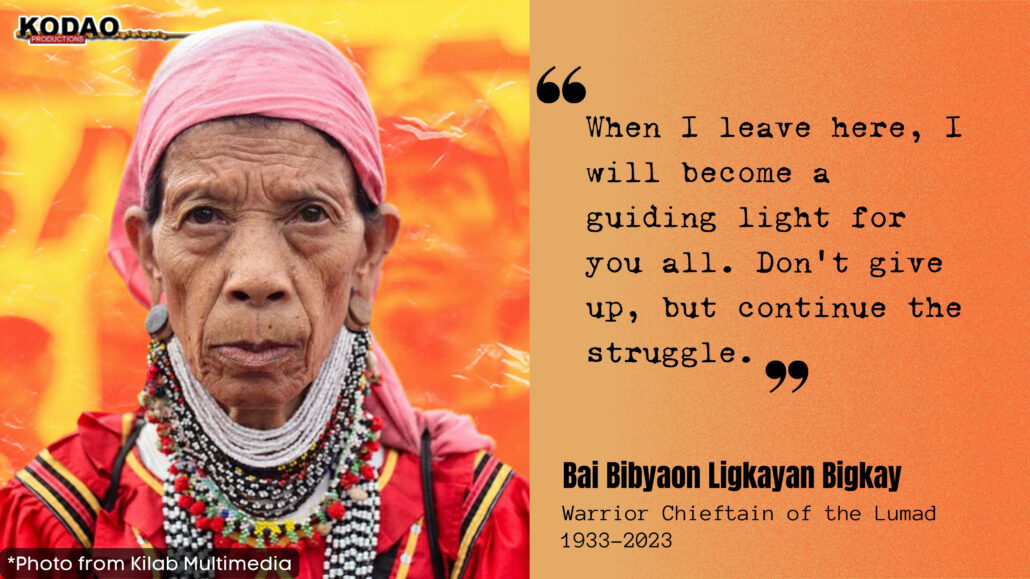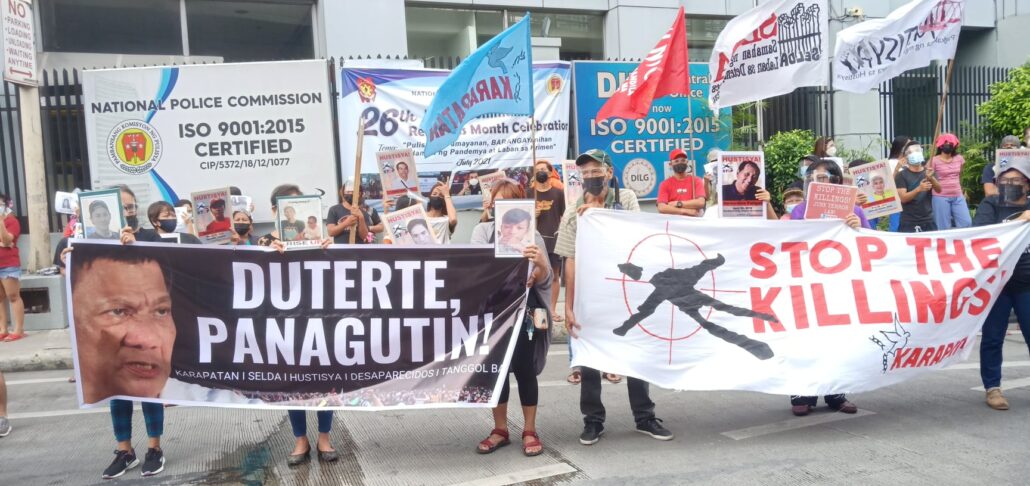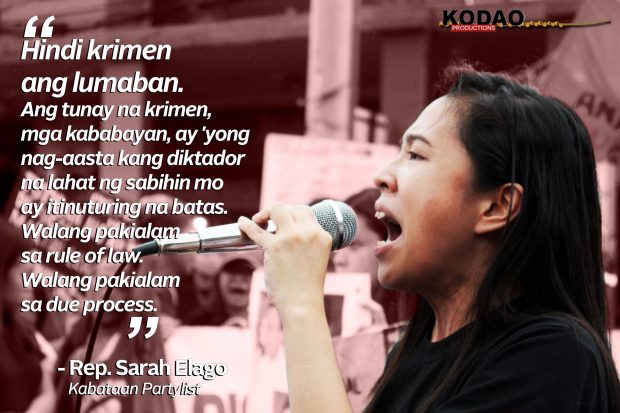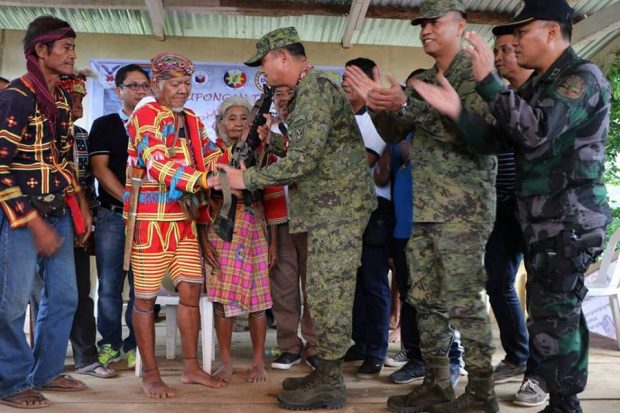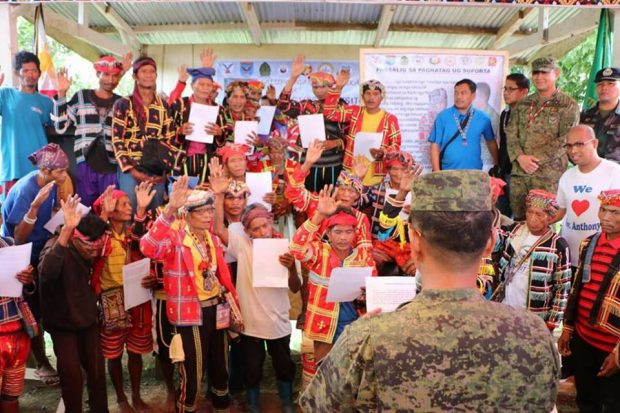On the term paramilitary, the US Defense Department defines it as “forces or groups distinct from the regular armed forces of any country, but resembling them in organization, equipment, training or mission” (US Defense Department, 2010). There are different types of militia groups in the Philippines and they are classified according to the involvement of the central government and the military. “CAFGUs for instance, are embedded in the military hierarchy. CVOs are an unarmed component of the local defense organization but when used as police force multipliers, the CVOs are being armed. The paramilitary groups (sometimes referred to as vigilante groups) are also employed by the government for counter-insurgency work against separatist and communist armed groups” (Centre for Humanitarian Dialogue, 2011).
Over several decades, the paramilitary groups in Mindanao have carried out torture, murder, extrajudicial killings, rape, looting of property, forced disappearances, and arson (Human Rights Watch, 2015; Karapatan, 2015; RMP-NMR, 2017). Yet a complete picture of atrocities remains elusive as many abuses go unreported as victims fear retaliation. In the second year of the AFP’s ‘Oplan Bayanihan’, there were 45 extrajudicial killings (EJKs), bringing the death toll to 129 under Aquino administration (RMP-NMR, 2016). Several attacks were directed at Lumad communities and their leaders who took a stand against the entry of large and destructive corporate entities with logging, mining, plantation, and energy interests in their ancestral domains. In a report by the Higala sa Lumad network, 7 out of 37 victims of EJKs are Lumad datus (RMP-NMR, 2016).
Lumad children suffer hardships during evacuations and demolitions, when they are driven from their homes (Vaishnav, 2017). In 2011 alone, 12 children were victims of extrajudicial killings, and at least 3, of frustrated killings—due to indiscriminate firing by soldiers, slay try on an adult companion, or at a violent demolition. Several children were also arrested during violent demolitions or accosted during military operations. At least four children and youths were tagged as “NPA child rebels,” while one was charged with violation to the Human Security. The same Lumad communities are forcibly evacuated in the countryside, as they sought shelter, either from bombings and aerial strikes, or from combat-geared “peace and development teams” and military-sanctioned paramilitary units that swoop down on their communities (Centre for Humanitarian Dialogue, 2011). Lumad schools, a target of violent rhetoric and red-tagging by President Duterte who calls these as training ground for NPAs, have also been bombed by both state military and paramilitary groups. That is on top of the murder of Emerito Samarca, executive director of ALCADEV, who was found lifeless in one of the classrooms, hogtied with his throat slit in 2015.
During the Aquino regime, the Philippines was also put to task at the Universal Periodic Review of the United Nations Human Rights Council, where at least 22 out of 69 countries called attention to the continuing cases of documented extrajudicial killings, disappearances and torture. Several countries called for the prosecution of former military officials and the dismantling of paramilitary groups. Some urged the Philippine government to act on the requests of UN Special Rapporteurs to visit the country, to which the government gave a tentative response, lamely citing lack of funds (Centre for Humanitarian Dialogue, 2011).
The perpetrators are identified military units, paramilitary groups formed by or closely linked to the military, and suspected death squads under the AFP’s command. Death squads—motorcycle-riding armed men, whether masked or barefaced—are still being employed to eliminate progressive personalities and suspected rebel supporters (Spear, 2015). Cases of Aquino’s executive order 79 served as marching orders to the Investment Defense Forces—the AFP, the CAFGU, and the paramilitary groups that are accredited as Special Civilian Armed Auxilliary (SCAA)—to clear the mining areas, and remove hindrances such as a resistant populace. In several instances, the military even tried to cover up by claiming that the civilian victims were NPA rebels killed in an encounter with soldiers.
The Murder of Lumad Datus
Over the years, Lumad leaders were recorded to have been killed by members of the Armed Forces of the Philippines and other state agents as a response to the unified campaign of Lumad communities against government atrocities.
On March 5, 2012, Jimmy Liguyon, 37, leader of the Matigsalog tribe and village chair of Dao, San Fernando, Bukidnon was shot in front of his house by Alde ‘Butchoy’ Salusad, leader of NIPAR (New Indigenous Peoples’ Army), a paramilitary group. Salusad, accompanied by his men, even declared that he killed Jimmy because he refused to sign a certification for SANMATRIDA, or the San Fernando Matigsalog, Tigwahanon, and Manobo Tribal Datu Association. NIPAR had been terrorizing residents in barangays Dao and Calagangan since the previous year. On August 16, Alde along with soldiers of the 8th IB and the CAFGU, set up four gold processing plants known locally as ‘Bolmellan’. They also cut indigenous trees as materials in constructing tunnels for their mining operation. Prior to that, on August 2, Alde’s father Benjamin ‘Nonong’ Salusad, a CAFGU member, came with 20 of his men and ransacked the tents of Matisalog gold panners in sitio Kiranggol, Dao, looking for gold dust and money. The gold panners returned home sitio Malungon, Calagangan village, but Benjamin Salusad also threatened to kill Datu Malapong Nayan, the tribal chief of the Matisalog in Calagangan, and municipal chair the Lumad group KASILO, which the gold panners belong to (Environmental Justice Atlas, 2012).
Alde Salusad and the NIPAR men had also accosted other residents, taking gold dust and money at gunpoint. They touted their guns around the residents, and even fired shots at children. This has pushed 62 families to leave their villages in late August that year. Some residents went to nearby communities, while others trekked to as far as Quezon, the next town. Those who had no relatives elsewhere went and hid in the forest (Albasin, n.d.). On August 29, the evacuees travelled from Quezon, Bukidnon to the provincial capitol in Malaybalay City where they stayed for a few months only to return again in the next years.
Another tribal leader, Margarito Cabal of Kibawe was shot three times in the chest and once in the back, and was dead on arrival at the hospital. He was known for his firm resistance against the establishment of Hydro-Electric Mega Dam – Pulangui V project of the First Bukidnon Electric Cooperative (FIBECO) which have eventually affected 22 barangays of Bukidnon and North Cotabato (Lopez, 2012). Ten barangays of Kibawe have been affected, including his home in Barangay Tumaras. He campaigned and organized residents of the affected barangays to oppose the construction of the said dam.
On the same year, several Lumad villages in Agusan del Sur refused to attend an assembly where an agreement that would allow entry of the plantation companies would be signed. The assembly was initiated by Ben Hur Mansulonay, a leader of an indigenous paramilitary group controlled by the AFP in San Luis. Since then, the community’s datu were under threat. Datus Lauron and Lapatis also actively campaigned against the entry of large-scale mining companies in Valencia, Bukidnon. Datu Lapatis also reported several incidents of harassments from NIPAR and the 8th IBPA (RMP-NMR, 2016).
In December 2014, village captain and traditional leader Datu Necasio ‘Angis’ Precioso, Sr. was killed by suspected members of a paramilitary group working with the 26th IBPA in San Luis, Agusan del Sur. Prior to his death, Datu Angis had been in an argument with M/Sgt. Andres Villaganas after the military called for members of the Banwaon community for interrogation. During the interrogation, Villaganas accused them of supporting the New People’s Army. In 2015, Manobo children and their families of Lianga, Surigao del Sur were forcibly taken out of their homes on September 1 by paramilitary group Bagani to witness the point-blank execution of tribal leader Dionel Campos and his cousin Aurelio Sinzo. Same perpetrators also bound Emerito Samarca or Tay Emok, ALCADEV’s executive director, by the neck and limbs in the faculty room, then stabbed him in the chest and slit his throat open (Capistrano, 2016).
In September 2016, gunmen who are suspected to be part of paramilitary group Alamara killed three tribal leaders in Lianga, Surigao del Sur (Velez, n.d.). The same group was implicated in numerous attacks during the same year, including nine killings in Cabanglasan, Bukidnon.
Paramilitary versus Lumad: Global Patterns
Colombia. The Katio and Chami peoples committed mass suicide between 2003 and 2004. The suicides took place at a time of extreme change, during which mining and logging companies depleted the jungles of animals that the indigenous peoples once hunted, forcing the once-nomadic Embera to form permanent communities. In this particular discussion of large-scale development projects, there was also reference to the impact of large dam projects upon indigenous communities in Colombia (Saab & Taylor, 2008). Unfortunately, in this case, the human rights violations became so grave as to include forcible removal from homes and lands, destruction of property as well as assassinations and disappearances carried out by paramilitary forces (UNPFII, 2009).
Myanmar. Testimony of abuses by State-controlled military or paramilitary forces has also been repeatedly given. According to information received by the Special Rapporteur on the human rights and fundamental freedoms of indigenous people, members of the village of Tagu Seik, near Einme, were tortured and their community ransacked on the basis of purported communications with another armed opposition group (Centre for Humanitarian Dialogue, 2011).
Kenya, Guatemala, and Mexico. The general pattern that holds for indigenous women worldwide is their vulnerability to sexual violence. In areas of conflict, indigenous women often fall victims to abuse by members of the military and are subject to sexual enslavement, forced pregnancy, gang-rapes, sexual mutilation and killing. Historically, violence against women was used as a weapon in colonial conquests of indigenous lands, but as recently as the 1980s and 1990s, 1,400 indigenous Samburu women of Kenya were raped by British soldiers stationed on their lands. In the 1980s, indigenous women were targeted for rape as a weapon of war in Guatemala. In the 1990s, indigenous women in Chiapas, Mexico were subject to compulsory servitude in paramilitary camps (UNFPII, 2009).
The rest of Latin America. In 2003, more than 100 indigenous peoples and leaders were murdered and the indigenous community in Sierra Nevada de Santa Maria was forcibly displaced. In the last 15 years, as political violence has escalated, more than 2,660 cases of human rights violations have been reported. Reports confirm that indigenous peoples have been the victims of several massacres perpetrated by paramilitaries, the guerrillas and other armed groups. State-sponsored military activities have included aerial bombing of rural and indigenous communities. Thousands of indigenous peoples have been displaced, resulting in increasing populations of refugees in the neighbouring countries of Brazil, Ecuador, Panama, Peru and Venezuela. Refugees have also fled to urban areas within Colombia where malnutrition and deaths due to hunger have been reported. Throughout the country, forced disappearances of indigenous leaders and representatives have been documented, as have reports of mass arbitrary detentions carried out by the military (UNPFII, 2009). #
= = = =
SOURCES-
-Albasin, G.C. n.d. Flashback Wednesday: Alde Salusad’s Victims. Cagayan de Oro, Philippines: Mindanao Interfaith Institute on Lumad Studies. Retrieved from http://www.miils.org/type/reports/flashback-wednesday-alde-salusad%E2%80%99s-victims
-Capistrano, Z.I.M.C. 27 January 2016. “Paramilitary Groups to Lumad schools: ‘all teachers, students will be massacred.’ Davao Today. Retrieved from http://davaotoday.com/main/human-rights/paramilitary-group-to-lumad-schools-all-teachers-students-will-be-massacred
-Centre for Humanitarian Dialogue. July 2011. Armed Violence in Mindanao: Militia and Private Armies. Geneva, Switzerland: Author.
-Chambers, P. 2012. “A Precarious Path: The Evolution of Civil-Military Relations in the Philippines.” Asian Security 8 (2): 138-163. Retrieved from https://library.xu.edu.ph, doi.org/10.1080/14799855.2012.686254
-Defense Department – United States of America. 2010. Department of Defense Dictionary of Military and Associated Terms. Washington, DC: Author. Retrieved from https://www.dtic.mil/doctrine/new_pubs/jp1_02.pdf.
-Environmental Justice Atlas. 2012. “Illegal Gold Mining and Killing of Anti-Mining Indigenous Leader Jimmy Liguyon, Mindanao, Philippines.” EnvironmentalJusticeAtlas.org. Retrieved from https://ejatlas.org/conflict/illegal-gold-mining-and-killing-of-anti-mining-indigenous-leader-jimmy-liguyon-mindano-philippines
-Karapatan. 2014. Karapatan Year-End Report on the Human Rights Situation in the Philippines. Quezon City, Philippines: Author.
-Human Rights Watch. 23 September 2015. Philippines: Paramilitaries Attack Tribal Villages, Schools. Retrieved from https://www.hrw.org/news/2015/09/23/philippines-paramilitaries-attack-tribal-villages-schools
-Lopez, A.D. 21 May 2012. “Stopping a Hydroelectric Dam.” Davao Today. Retrieved from http://davaotoday.com/main/politics/stopping-a-hydroelectric-dam
-RMP-NMR. 2016. Peoples’ Rights in the Peripherals: Lumad Rights in the Last 18 Months of President Aquino III.Iligan City, Philippines: Rural Missionaries of the Philippines-Northern Mindanao Region. Retrieved from https://www.rmp-nmr.org.
-RMP-NMR. 2017. State of Unchange: Lumad Rights a Year into the Duterte Administration. Iligan City, Philippines: Rural Missionaries of the Philippines-Northern Mindanao Region. Retrieved from https://www.rmp-nmr.org.
-Saab, B.Y. & A.W. Taylor. 2012. “Criminality and Armed Groups: A Comparative Study of FARC and Paramilitary Groups in Colombia.” Studies in Conflict & Terrorism 32 (6): 455-475. Retrieved from https://library.xu.edu.ph, https://doi.org/10.1080/10576100902892570
-Spear, L. 15 September 2015. “A ‘Civil War’ Is Being Waged Against Indigenous Tribes in the Southern Philippines, Rights Group Says.” Time. Retrieved from http://time.com/4028811/philippines-lumad-mindanao-indigenous-military-war-killings
-UN Secretariat of the Permanent Forum on Indigenous Issues. 2009. State of the World’s Indigenous Peoples. New York, NY: Author.
-Vaishnav, P. 2017. “Child Protection and UNICEF’s Communication and Media Strategy: A Conflict-related Study from Mindanao, Philippines.” In Andersen, R. & P.L. de Silva (editors), Routledge Companion to Media and Humanitarian Action. London, UK: Routledge.
-Velez, T. n.d. “Alamara, the Paramilitary Gripping Davao’s Lumad Communities.” Cagayan de Oro, Philippines: Mindanao Interfaith Institute on Lumad Studies. Retrieved from http://www.miils.org/type/reports/alamara-paramilitary-gripping-davaos-lumad-communities.
= = = =
This article was originally published by the Mindanao Interfaith Institute on Lumad Studies, a part of the Healing the Hurt Project of the Rural Missionaries of the Philippines-Northern Mindanao Region. This project is supported by the European Union.
Views expressed in this article are the sole responsibility of the RMP-NMR Inc and the “Healing the Hurt” Project partners and can in no way be taken to reflect the views of the European Union.
